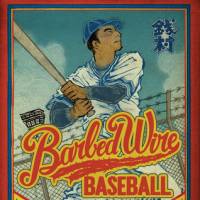"Barbed Wire Baseball" is an informative and imaginative retelling of the true story of Kenichi "Zeni" Zenimura (1900-68), the father of Japanese-American baseball.
Barbed Wire Baseball, by Marissa Moss, Illustrated by Yuko Shimizu.
48 pages
HARRY N. ABRAMS, Nonfiction.
Author Marissa Moss relates how he was born in Japan, grew up in Hawaii and later moved to California, where he had been enjoying a successful career coaching and playing baseball, even taking the field with American legends Lou Gehrig and Babe Ruth for an exhibition game.
World War II momentarily shattered his field of dreams, but Zeni persevered. As one of over 110,000 Japanese people forced into "relocation" camps during the war, Zeni constructed a baseball field while living at the Gila River internment camp in Arizona.
Moss' retelling captures the unifying power of sport and the importance of passion, while award-winning illustrator, Yuko Shimizu, lends her distinctive, surreal style to the story — an effective complement to Moss' uplifting message.
In the book, Moss frames Zeni's determination to build a baseball field — a diamond literally formed from the arid desert nothingness of the internment camp — in terms of humanity's constant capacity for hope during hardship.
A thorough afterword details in the facts of Zeni's life and accomplishments, including historical photos and information about his life after the war.
"Barbed Wire Baseball" is an award-winning book that uses history to teach the importance of dreams.



